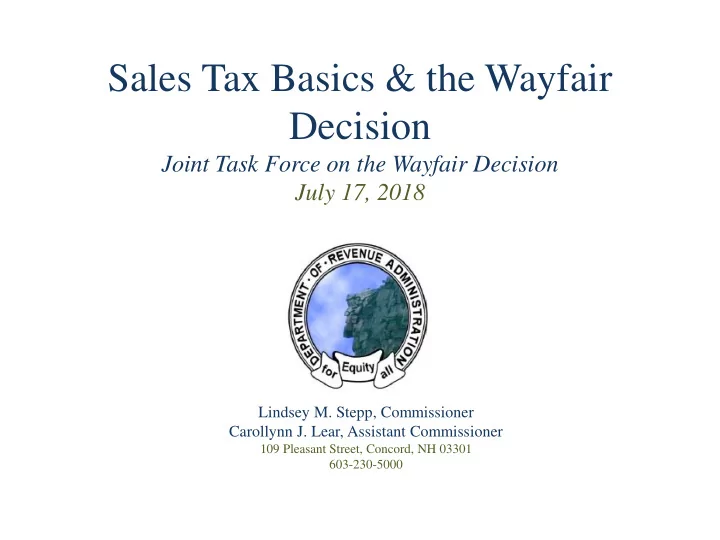

Sales Tax Basics & the Wayfair Decision Joint Task Force on the Wayfair Decision July 17, 2018 Lindsey M. Stepp, Commissioner Carollynn J. Lear, Assistant Commissioner 109 Pleasant Street, Concord, NH 03301 603-230-5000
Sales Tax Basics & the Wayfair Decision This presentation is intended for informational purposes only, and is not a substitute for seeking professional advice or for reviewing the applicable laws and rules. This presentation represents some positions of the Department on the limited issues discussed herein, based on the law in effect at the time of the presentation and Department interpretation thereof, as well as the opinions and conclusions of its presenter. For the current status of any tax law, practitioners and taxpayers should consult the source documents (i.e., Revised Statutes Annotated, Rules, Case Law, Session Laws, etc.) for independent verification. Page 2
Sales Tax • A tax applied to the sale of goods or services to the ultimate consumer. Typically, the consumer is obligated to pay the tax and the vendor or seller is obligated to collect the tax from the consumer and remit the tax to the state. • Most states exclude sales for resale. • Most states exclude the sale of components or ingredients used to manufacture. • Most states have an occasional sales exemption. • Many states tax only the sale of tangible goods (not intangible goods or services). • Many states exempt the sale of grocery items and other essentials from taxation. Page 3
Use Tax Levied upon the use, storage, or consumption in the state of taxable goods that have not been subjected to the state’s sales tax. The use tax imposes an exaction equal in amount to the sales tax that would have been imposed on the sale in question if the sale had occurred within the state’s taxing jurisdiction. Example 1: If a Massachusetts resident drives to Nashua to purchase a television which they then drive back to Massachusetts and install in their Massachusetts home, the Massachusetts use tax is owed. Example 2: If a Massachusetts resident drives to Nashua to purchase a television which they install in their New Hampshire vacation home, Massachusetts use tax is not owed. With the use tax, it is the location where the item is to be used that determines if and how much use tax is owed. Page 4
Collection Obligation: Traditional Sellers • The consumer is always the party legally obligated to pay the sales tax and/or remit the use tax. • For traditional sales, meaning those transacted in-person, the vendor or seller has always been obligated to collect the sales tax from the purchaser and remit the tax to the state where the sale occurred. Page 5
Collection Obligation: Remote Sellers • Sales completed utilizing the mail, internet, or telephone. • The consumer is still always the party legally obligated to pay the sales tax and/or remit the use tax. Pre-Wayfair • A remote seller was not obligated to collect a state sales tax from the purchaser unless the seller had a physical presence in the state where the title passes to the purchaser (typically the purchaser’s state of residence). Post-Wayfair • A remote seller may be obligated to collect a state sales tax from the purchaser even if the seller does not have a physical presence in the state where the title passes to the purchaser (typically the purchaser’s state of residence). • To determine whether a seller now has an obligation to collect a state sales tax, the seller must evaluate whether they have “substantial nexus” with the taxing state. The Supreme Court did not rule on what will qualify as “substantial nexus;” meaning, that issue is likely to get litigated over the coming years. Page 6
Meals and Rentals Tax Comparison Imposition of Tax Traditional Sales Tax NH M&R Tax A sales tax is imposed on the The M&R Tax is imposed sale or rental of tangible specifically on the sale of personal property and certain meals and the rental of hotel services in the taxing rooms and motor vehicles in jurisdiction. New Hampshire. Page 7
Meals and Rentals Tax Comparison Collection Obligations Traditional Sales Tax NH M&R Tax A seller having a place of business The operator is required collect in the taxing jurisdiction must and remit the M&R Tax to New collect and remit the sales tax to Hampshire. the taxing jurisdiction. A seller not having a place of The operator has a place of business in the taxing jurisdiction business within New Hampshire, must still comply with collection including through agency. obligations, provided that it has other physical presence in the taxing jurisdiction. Page 8
Meals and Rentals Tax Comparison Use Tax Traditional Sales Tax NH M&R Tax A sales tax has a complementary There is no complementary tax, use tax, which is imposed on the because the operator sells taxable storage, use, or other consumption meals, operates a hotel, or rents of tangible personal property and motor vehicles in New certain services in the taxing Hampshire. jurisdiction. A remote seller may need to The operator and the purchaser, collect and remit the use tax to the occupant, or renter are in New taxing jurisdiction (as a result of Hampshire. The sale or rental is Wayfair ). in person. Page 9
Recommend
More recommend